Reflection on the relationship between fashion, identity, gender, race, and class:
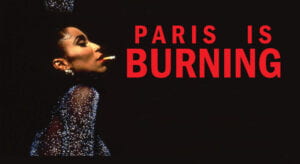
Fashion is a way for us to express ourselves and for others to understand us; it is a language not composed of letters; it corresponds to both parties, where one is the writer and the others are the readers. The identity image presented by people’s clothing is the result of both the writer and reader expressing and interpreting. Like all writers of written texts, certain fashion creators also have certain audiences. People’s guessing of others’ identities through fashion can lead to different perspectives.
In the movie “Paris is Burning,” queer individuals express themselves through making and matching clothing in “the balls” events, aspiring to become superstars at gatherings where people similar to themselves will appreciate, identify with, admire, and appreciate them. The external manifestation of this appreciation is cheering for the clothing, while the internal reason is the recognition of others’ identities. When one’s fashion expression is acknowledged by others, they gain a sense of self-satisfaction. Even if they are not accepted by mainstream society at the time, they may feel discouraged, but they do not give up their fashion. I believe that for them, or each of us, being true to oneself in fashion is more important than conforming to others.
Fashion, to a certain extent, represents identity, gender, race, and class. But it cannot fully define a person. After all, one should not dictate what kind of clothes a person must wear. Understanding others through fashion ultimately also relies on the projections we already have in our minds. Fashion is a reading comprehension with only reference answers and no standard answers. Fashion is limitless, and so is everyone’s identity.
[By the way, I really love the song in the movie “Got to Be Real” and the movie poster. So beautiful ^^]
Inspiration for Masks: Queer in China (or maybe “drag queen” in China):
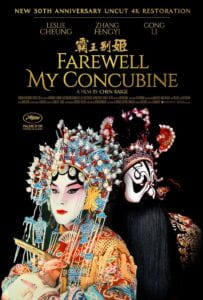
[Left: Dieyi Cheng (Consort Yu, concubine); Right: Xiaolou Duan (Xiang Yu, the Conqueror )]
“I was by nature a woman (a man), but not a man (a woman).” —— Consort Yu (Dieyi Chen) in Farewell, My Concubine.
I teamed up with Chanel for this group assignment. Last week, I just finished watching the famous Chinese LGBTQ+ film “Farewell, My Concubine” in another class (Queer China). It tells the story of Peking Opera during the late Qing and Republic of China periods. The actors in the opera either wear masks or paint their faces to represent their identities. Our brainstorming session started with this and the plot of the movie.
In traditional Chinese Peking Opera, there are many roles where men dress as women. The protagonist of this movie, Dieyi, is one such character. He was born male, but in the movie, he plays the role of Consort Yu, a woman, in the Peking Opera “Farewell, My Concubine.” Since childhood, he has always sung one line from the opera incorrectly: “I was by nature a woman, but not a man”; he always sings it as “I was by nature a man, but not a woman.” He gets severely punished by his master whenever he makes this mistake. When he finally sings it correctly, his understanding of his own identity also changes. He believes he is Consort Yu and falls in love with his partner, Xiaolou, who plays the Conqueror role (Consort Yu’s husband) in that opera. Dieyi loves Xiaolou onstage and offstage, he cannot distinguish between reality and fiction, but Xiaolou can. He cannot love another man, nor can he understand why a man would love another man. Amid societal criticism and the betrayal of his lover, at the end of the movie, Dieyi once again sings that line incorrectly, just like when he was a child. Did he break character? Perhaps. Or maybe he finally realized that, as a queer person, he could never win the love of his beloved. All the glory, history, and love between Consort Yu and the King belong to Consort Yu’s character alone, and he ultimately has nothing. His entire life is lived within the confines of the opera, society, and the projections of others onto him. In these projections, he has to become her; in these projections, he can never truly be her. He commits suicide, killing Consort Yu, and also himself (or herself), ensnared by countless projections.
Concept: “Projection”:
In the eyes of others, who are we? In our hearts, who are we? Who are we, really? Amidst countless projections, there is no definitive answer. Under this theme, we created two masks, from the opera, from Dieyi Cheng, about China, about us, and maybe somewhat about some part of everybody.
1: “Position”
Hair?
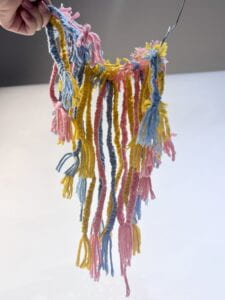
When worn under the chin, what does it resemble? A veil of ancient women? A beard of an opera singer? Perhaps.
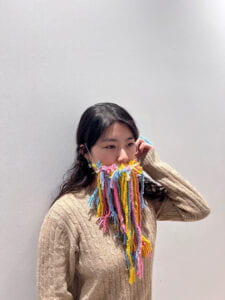
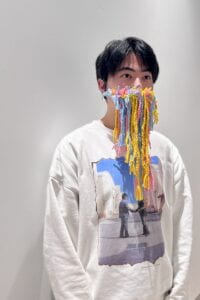
Worn on the top of the head, what is it? A braid? Or the hanging curtain of a king?
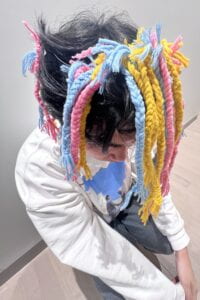
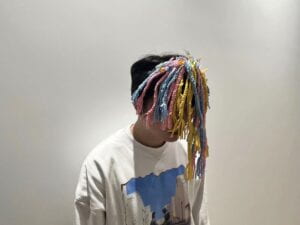 Who wears it? Male or female?
Who wears it? Male or female?
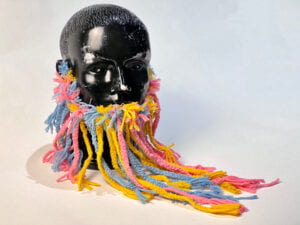
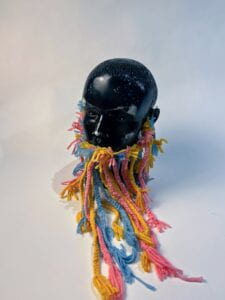

Raise it a bit higher, what do you think of it? Maybe a rattling toy for infants. Boys and girls, both can enjoy playing with it. Perhaps it is in the age where we don’t need to find a place for anything, that we can truly be ourselves without being defined.
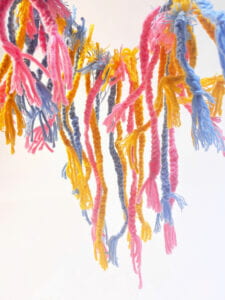
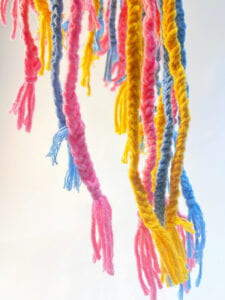
2: “Wraps me snugly”
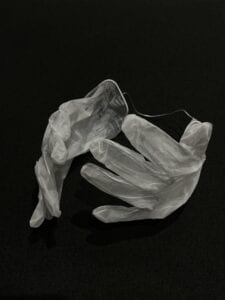

We are molded by countless nameless, invisible yet powerful hands—
What are we truly like? Are we what others want us to be? Are we what we want to be? Are those desired images truly our true selves?
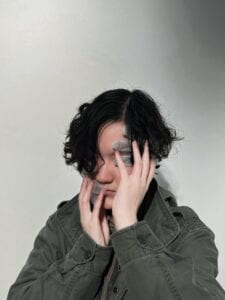 “I am a trap inside a trap, an inhabited inhabitant, an embraced embrace, a question in answer to a question.” ——The Sky, Wislawa Szymborska
“I am a trap inside a trap, an inhabited inhabitant, an embraced embrace, a question in answer to a question.” ——The Sky, Wislawa Szymborska
Another “mask” assignment about this poem, by Luna and Chanel, December 2022, before the epidemic control is lifted.
Living in society, even without a pandemic, we all wear masks.—— Thoughts in 2024, after watching Paris is Burning and Farewell, My Concubine.
BTS Photos: (Great Thanks to 3 models!)
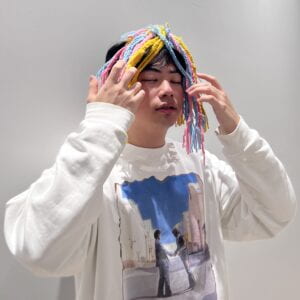
Model: Freddie
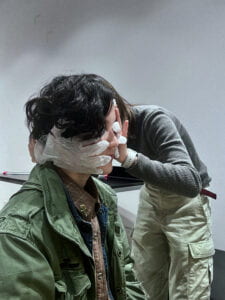
Model: Astroyd
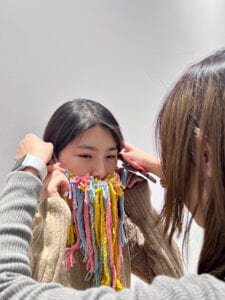
Model: Ricci
Leave a Reply